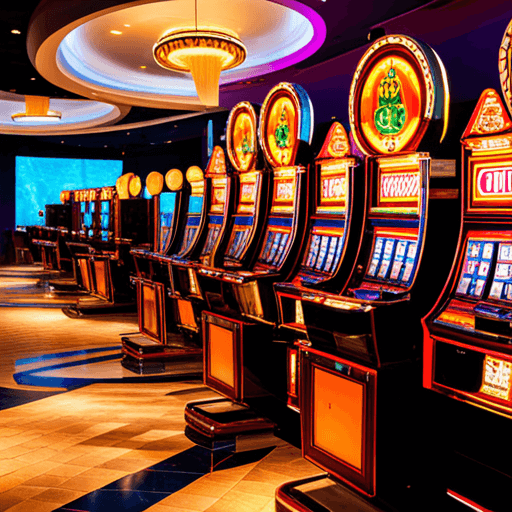
As tech keeps to advancing at a fast pace, the world of amusement has been undergoing a major transformation. A of the best exciting advancements in recent years has been the rise of VR realities, that has started in redefine the way we perceive various forms of games. The casino industry, known for its lively environment and thrilling moments, is no different. Through the incorporation of VR into casino games, players can have the opportunity to dive themselves in highly immersive environments which echo the thrill of a physical gambling hall, all within the comfort of their personal houses.
Picture walking into a virtual gambling venue in which you can interact with fellow players, participate in real-time host sessions, and discover a wide-ranging variety of play choices, all enhanced by cutting-edge technology. This new method not only amplifies the excitement of traditional gambling games and additionally removes geographical barriers, allowing players from the world to link and engage in a collective playing experience. Looking ahead, as we look ahead, the possibilities for VR in the domain of gambling titles are limitless, offering to reshape the manner we perceive about betting and entertainment altogether.
The Ascent of VR in Video Games
The introduction of VR technology has transformed multiple industries, and the gaming industry is at the vanguard of this revolution. More than just a trend, VR delivers an immersive experience that brings players nearer to the gameplay like never before. Gambling establishments have begun to utilize this technology, creating atmospheres that mimic the thrill and atmosphere of a brick-and-mortar casino, conveniently from the ease of home. This shift not only improves gameplay but also attracts a younger audience of players eager for innovative experiences.
As VR grows to be more affordable, the selection of games available in this medium continues to grow. Players can now participate with favorite games such as blackjack, poker, and slots in a three-dimensional space where they can interact with other players and croupiers in real-time. This immersive aspect enhances the social interaction, allowing users to feel as if they are integral to a lively casino environment even while physically isolated. The added layer of realism provided by virtual reality is attractive and is probably to shape how casino games are designed and experienced in the times to come.
Furthermore, the adoption of virtual reality into casino gaming is expected to spur advancements in tech and design. Developers are testing with innovative game mechanics and features that utilize VR’s full potential. These developments could lead to a diverse array of casino game options that not only would reflect the essence of classic games but also offer new formats and ways to play. By adopting virtual reality, casinos can remain competitive in a fast-changing gaming landscape, ensuring they satisfy the demands of modern players seeking thrilling and engaging experiences.
Enhancing User Experience in Online Casinos
VR technology is revolutionizing the way players interact with gambling games, developing engaging atmospheres that replicate the vibe of a real casino. By putting on a virtual reality headset, players can step into a virtual world where they can engage in realistic 3D models of gaming options. This engagement enhances the attachment players have with their play experience, making every spin of the slot machine or dice roll feel more thrilling and realistic.
In addition to visual experiences, the use of haptic feedback technology gives players with tactile experiences that enhance gameplay. For instance, as a player achieves a game in virtual poker, they can receive feedback through their controllers that mimic the feeling of collecting winnings in the real world. This element of sensory feedback makes the experience more captivating and fills the gap between real-life and online gaming settings. 32win
Community interaction is another key aspect that virtual reality brings to gaming experiences. Players can participate in social gaming, enjoying the thrill of playing with peers or strangers in a common virtual environment. This communal aspect fosters a community feeling and camaraderie, which is often lacking in conventional online gaming. By enabling players to communicate and interact in live, VR casinos restore the interactive environment that many players cherish in physical casinos, ultimately leading to a more fulfilling and more enjoyable gaming experience.
Future Trends and Innovations in VR Gaming Environments
As technology continues to evolve, the integration of artificial intelligence and machine learning into Virtual Reality gaming environments is poised to transform the player experience. These improvements will enable for greater customized gameplay by adapting games to unique player preferences and habits. Players can look forward to seamless interactions with digital dealers and AI-driven companions that enhance immersion and engagement, forming a lifelike casino atmosphere from the comfort of their homes.
In addition, the introduction of blockchain promises to redefine the security and transparency of transactions in VR casinos. With automated agreements allowing quicker payouts and provable fairness in game outcomes, players can have confidence knowing that their funds are secure. This combination of technologies can build trust and nurture a bigger player community, encouraging more people to delve into digitized gambling settings.
Additionally, the development of community engagement within Virtual Reality gaming environments is expected to take the spotlight. Future advances may facilitate deeper connections among players, offering features such as digital chat rooms, multiplayer competitions, and even real-time events. By including community elements, these enhancements will not only improve the gaming experience but also create a dynamic community where players can share strategies, acknowledge wins, and enjoy fellowship in a lively digital setting.
